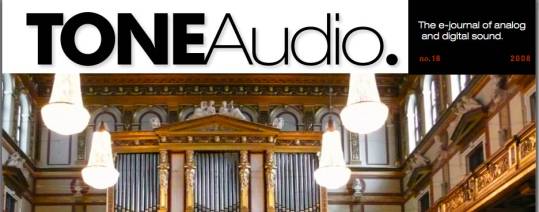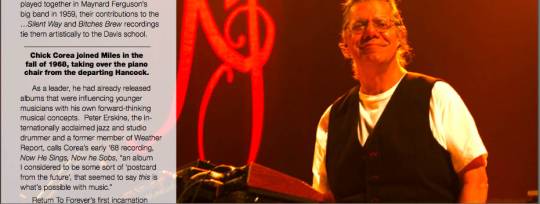
"The Return of Return To Forever"
Tone Publications Vol.16 P.38
Copyright © 2008 Anne Farnsworth & Tone Audio Magazine

When Chick Corea introduced his seminal fusion band Return To Forever in 1972, did he foresee the prophetic nature of its name? 35 years later, Corea and original members bassist Stanley Clarke, guitarist Al DiMeola and drummer Lenny White, are in the midst of a world tour of concerts that are thrilling its original fan base and turning a new generation on to the sound of what is arguably the last significant innovation in jazz.
Jazz has always drawn its inspiration from the culture at large. In the early 20th century, New Orleans musicians added improvisation and the syncopated rhythms of ragtime to the instrumentation and march tempos of Sousa-style military bands. Big bands of the Swing Era inserted improvisation into their dance-friendly offerings. The Bebop revolution rewrote the melodies of those swing tunes and sped up the tempos, creating a new sound that was as technically challenging to play as it was intellectually

challenging to listen to. Along with original compositions, the standard jazz repertoire has always included songs from the hit parade and Broadway.
So it was natural that the juggernaut of the '60's rock revolution would impress itself on the jazz community. Merging the improvisatory and virtuosic elements of jazz with the instrumentation, rhythm and volume levels of rock created the new sound called Jazz/Rock Fusion.
This jazz hybrid was revelatory to young musicians, for some even life changing. Guitarist Richard Smith, chair of the Studio Guitar Department at the University of Southern California and a player who frequently tops the international polls and smooth jazz charts, credits a Return To Forever concert he heard at the age of 14 with setting the course of his musical career, calling it "the single most influential

musical event of my life."
When the concert ended he rode his bike home as fast as he could and made a late-night call to his girlfriend "to break up with her [because] I wanted to dedicate myself to a professional music career." He then set out to stay up all night practicing guitar. "I made it to about 4:00 AM," he recalls with a chuckle. The next morning found him “desperately trying to get back together with my girlfriend.” He didn't succeed but within a year was playing in local jazz bars. "I never looked back," he says.
Miles Davis is most often credited with spearheading the

contributions to the …Silent Way and Bitches Brew recordings tie them artistically to the Davis school.
Chick Corea joined Miles in the fall of 1968, taking over the piano chair from the departing Hancock. He had already released albums as a leader that were influencing younger

musicians with his own forward-thinking musical concepts.
Peter Erskine, the internationally acclaimed jazz and studio drummer and a former member of Weather Report, calls Corea's early '68 recording, Now He Sings, Now he Sobs, "an album I considered to be some sort of 'postcard from the future', that seemed to say this is what's possible with music."
Return To Forever's first incarnation was Latin-influenced, featuring Brazilian singer Flora Purim and her husband, percussionist Airto Moreira, in addition to Clarke and saxophonist Joe Farrell. Purim and Moreira left to start their own group, with Farrell moving on as well. Corea tapped Lenny White and guitarist Bill Connors to join himself and Clarke, changing not only the instrumentation, but the style as well. The band's sound became a more melodically and rhythmically complex distillation of American rock, taking

influences from and interweaving perfectly with the long-form progressive rock of groups like Yes, King Crimson and Genesis being played on college and the new album-oriented radio stations.
Although it was Corea's vision and compositional style that formed the basis of this more sophisticated electric sound, Clarke's innovative approach to the bass was an important element. He and his contemporary Jaco Pastorius are credited with expanding the historical role of the bassist from timekeeper to melodic and harmonic focal point. Clarke also





integrated and expanded the slapping technique popularized by funk bassist Larry Graham of Sly And The Family Stone, fusing it with his own classically trained virtuosity. Those innovations along with his writing and subsequent headlining of his own tours are what put Clarke at the forefront of the 1970's "bass revolution" that brought the traditionally supportive instrument to center stage.
Al Dimeola was 19-years-old when he joined RTF in 1974. Erskine recalls, "Al DiMeola inspired the rest of us young musicians that it was possible to get into a really cool band just out of school." Di Meola grew to become one of the fusion's most important guitarists and one of the first 'shredders', the rapid fingering technique that in circular fashion crossed back over to the world of rock and heavy metal. Di Meola has gone on to record over 21 albums as a leader, many of which emphasize Spanish and Latin American-influenced rhythms and harmonies, echoing Corea's original RTF recordings.
Drummer Lenny White began his recording career playing on Bitches Brew, and has been quoted as saying his major influence is co-Miles alumnus Tony White. Along with his own projects, he has played with and produced a variety of artists like Dianne Reeves, Chaka Khan and Rachelle Farrell. He stays on the cutting edge working with hip-hop artists like Big Daddy Kane and writing soundtracks for television and movies.
Considering the activity and prodigious output of these four award-winning musicians - playing, producing, composing - it's remarkable that they were able to coordinate their schedules to create this tour. According to Corea, the logistics took some time to organize.
"The speed and intensity of our conversations increased and the desire got kindled more and more until we finally just said, 'Let's nail down the summer of ‘08’," Corea told Bill White in the Seattle Post-Intelligencer.
And what should audiences expect to hear at these shows? "We have chosen the compositions we like to play,” says Corea, “which seem to agree with what the fans like to hear. Our approach to them is definitely different than it was in the '70s but they are basically the same songs."
Trumpeter John Thomas toured with RTF in 1977. "We rehearsed for three weeks, five hours a day,” he recalls. “There were moments where a musical climax would bring goose bumps on all of the band members’ arms, every time, during rehearsals and concerts. The audience would have the same reaction and sometimes would leap out of their chairs and scream with excitement."
And what of Corea’s classic keyboard sound? "The meat of my keyboard sound is my Fender Rhodes from the '80s," he tells journalist White. "It's been tweaked into a practically new instrument and sounds great. I've also got a new model of the old mini-Moog called Voyager, which I just started fooling around with about a year ago."
In honor of the tour, Concord Records has released The Anthology, a remixed and remastered collection of 20 RTF favorites personally selected by the band. Grammy-award winning producer Mick Guzauski took the original master tapes down to the basics, carefully restoring them with studio tools not available when the cuts were originally recorded. The result is an enhancement of the original sound, not the loss of quality that often happens with digital transfers.
Peter Erskine speaks for all fans when he says, "I have very fond and grateful memories of listening to and being inspired by Return To Forever. I'm glad that they're all here, in good health and playing together again."